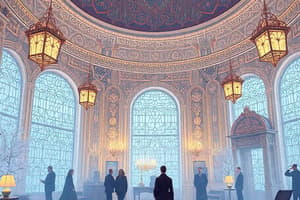Podcast
Questions and Answers
Which period saw a resurgence of interest in classical art and literature, alongside significant religious changes?
Which period saw a resurgence of interest in classical art and literature, alongside significant religious changes?
- Middle Ages
- Age of Exploration
- Enlightenment and Revolutions
- Renaissance and Reformation (correct)
In a society where economic decisions are primarily based on long-standing traditions and customs, which economic system is most likely in place?
In a society where economic decisions are primarily based on long-standing traditions and customs, which economic system is most likely in place?
- Command Economy
- Traditional Economy (correct)
- Market Economy
- Mixed Economy
Which form of government is characterized by a small group of individuals holding power?
Which form of government is characterized by a small group of individuals holding power?
- Democracy
- Theocracy
- Autocracy
- Oligarchy (correct)
What geographic theme focuses on how humans adapt to, depend on, and modify their surroundings?
What geographic theme focuses on how humans adapt to, depend on, and modify their surroundings?
The spread of sushi from Japan to the United States is an example of which concept?
The spread of sushi from Japan to the United States is an example of which concept?
Which civic responsibility involves serving on a panel to impartially determine a verdict in a legal case?
Which civic responsibility involves serving on a panel to impartially determine a verdict in a legal case?
Which landmark document asserts the principle of limited government and the protection of individual rights?
Which landmark document asserts the principle of limited government and the protection of individual rights?
What global issue involves the long-term changes in temperature and weather patterns?
What global issue involves the long-term changes in temperature and weather patterns?
Which economic system combines elements of both market and command economies, where decisions are influenced by both supply and demand, and government intervention?
Which economic system combines elements of both market and command economies, where decisions are influenced by both supply and demand, and government intervention?
The increasing interconnectedness of the world through trade, communication, and cultural exchange is best described as what?
The increasing interconnectedness of the world through trade, communication, and cultural exchange is best described as what?
A high school is creating a new interdisciplinary course. Which combination of disciplines would best represent the integrated nature of social studies?
A high school is creating a new interdisciplinary course. Which combination of disciplines would best represent the integrated nature of social studies?
A student is researching the economic impact of a new manufacturing plant on a local community. Which social science discipline is MOST relevant to this research?
A student is researching the economic impact of a new manufacturing plant on a local community. Which social science discipline is MOST relevant to this research?
Which activity best fosters civic engagement among students, aligning with the primary goals of social studies education?
Which activity best fosters civic engagement among students, aligning with the primary goals of social studies education?
A social studies teacher wants to design a lesson that integrates the themes of 'People, Places, and Environments' with 'Global Connections.' Which activity would best achieve this integration?
A social studies teacher wants to design a lesson that integrates the themes of 'People, Places, and Environments' with 'Global Connections.' Which activity would best achieve this integration?
A student is assigned to analyze the causes and effects of the French Revolution. Which skills are MOST essential for completing this task effectively?
A student is assigned to analyze the causes and effects of the French Revolution. Which skills are MOST essential for completing this task effectively?
In a social studies project, students are tasked with proposing solutions to a current environmental problem in their community. Which skill is MOST crucial for the success of this project?
In a social studies project, students are tasked with proposing solutions to a current environmental problem in their community. Which skill is MOST crucial for the success of this project?
Which scenario best demonstrates the application of 'Science, Technology, and Society' as a key theme in social studies?
Which scenario best demonstrates the application of 'Science, Technology, and Society' as a key theme in social studies?
A social studies curriculum aims to enhance students' understanding of 'Time, Continuity, and Change.' Which instructional strategy best aligns with this goal?
A social studies curriculum aims to enhance students' understanding of 'Time, Continuity, and Change.' Which instructional strategy best aligns with this goal?
Flashcards
Social Studies
Social Studies
Integrated academic field studying social sciences, humanities, and history to promote civic competence.
History
History
The study of past events, people, and societies.
Geography
Geography
The study of Earth's physical features, inhabitants, and phenomena.
Political Science
Political Science
Signup and view all the flashcards
Economics
Economics
Signup and view all the flashcards
Culture
Culture
Signup and view all the flashcards
Time, Continuity, and Change
Time, Continuity, and Change
Signup and view all the flashcards
Prehistory
Prehistory
Signup and view all the flashcards
Middle Ages
Middle Ages
Signup and view all the flashcards
Renaissance and Reformation
Renaissance and Reformation
Signup and view all the flashcards
Age of Exploration
Age of Exploration
Signup and view all the flashcards
Enlightenment and Revolutions
Enlightenment and Revolutions
Signup and view all the flashcards
Industrial Revolution
Industrial Revolution
Signup and view all the flashcards
Traditional Economy
Traditional Economy
Signup and view all the flashcards
Command Economy
Command Economy
Signup and view all the flashcards
Market Economy
Market Economy
Signup and view all the flashcards
Autocracy
Autocracy
Signup and view all the flashcards
Oligarchy
Oligarchy
Signup and view all the flashcards
Study Notes
- Social studies integrates social sciences, humanities, and history.
- The primary goal of social studies is to foster civic competence.
- Social studies aims to educate and involve students in gaining knowledge, skills, and attitudes.
- This prepares students to be active citizens in a democratic society.
Disciplines within Social Studies
- History examines past events, people, and societies.
- Geography studies the Earth's physical features, inhabitants, and phenomena.
- Political Science focuses on government systems and political behavior.
- Economics deals with the production, distribution, and consumption of goods and services.
- Sociology analyzes social behavior, institutions, and societal development.
- Anthropology explores human societies, cultures, and their development.
- Psychology studies the human mind and behavior.
Key Themes in Social Studies
- Culture involves understanding diverse cultural practices, beliefs, and values.
- Time, Continuity, and Change include examining historical timelines, patterns, and transformations.
- People, Places, and Environments focus on the interactions between humans and their environment.
- Individual Development and Identity explore personal growth, self-awareness, and identity formation.
- Individuals, Groups, and Institutions investigate the roles and functions of various social structures.
- Power, Authority, and Governance analyze systems of government and the distribution of power.
- Production, Distribution, and Consumption study economic systems and resource management.
- Science, Technology, and Society examine the impacts of technological advancements on society.
- Global Connections involve understanding the interconnectedness of nations and cultures.
- Civic Ideals and Practices promote responsible citizenship and democratic values.
Skills Developed Through Social Studies
- Critical Thinking involves analyzing information and forming reasoned judgments.
- Problem-Solving includes identifying issues and developing effective solutions.
- Research focuses on gathering, evaluating, and synthesizing information from various sources.
- Communication includes expressing ideas clearly and effectively, in both speech and writing.
- Collaboration means working effectively with others towards a common objective.
- Civic Engagement involves participating in community activities and advocating for positive change.
Historical Eras and Events
- Prehistory marks the period before written records, encompassing the Paleolithic and Neolithic eras.
- Ancient Civilizations include the rise and fall of early societies like Mesopotamia, Egypt, Greece, and Rome.
- Middle Ages span the period between the fall of the Roman Empire and the Renaissance in Europe.
- Renaissance and Reformation represent a time of renewed interest in classical art, literature, learning, and religious reforms.
- Age of Exploration denotes the period of European exploration and colonization of the Americas, Africa, and Asia.
- Enlightenment and Revolutions refer to the intellectual and political movements emphasizing reason, individual rights, and democratic ideals, including the American and French Revolutions.
- Industrial Revolution signifies the transition to new manufacturing processes in Europe and the United States.
- 20th Century was marked by World Wars, the Cold War, and significant social and technological changes.
Economic Systems
- Traditional Economy depends on customs, traditions, and historical precedents for economic decisions.
- Command Economy features government control of the means of production and economic decisions.
- Market Economy relies on supply and demand to drive economic decisions, with minimal government intervention.
- Mixed Economy combines aspects of both market and command economies.
Forms of Government
- Autocracy represents rule by a single person with unlimited power.
- Oligarchy signifies rule by a small group of individuals.
- Democracy means rule by the people, typically through elected representatives.
- Republic is a government in which the head of state is not a monarch, and the people have some power.
- Theocracy is where religious leaders rule.
Geography Concepts
- Location can be absolute (coordinates) or relative (in relation to other places).
- Place includes physical and human characteristics of a location.
- Human-Environment Interaction refers to how humans adapt to and modify their environment.
- Movement describes the flow of people, goods, and ideas.
- Region refers to areas with unifying characteristics.
Culture and Society
- Cultural Diffusion is the spread of cultural beliefs and activities from one group to another.
- Cultural Norms are shared expectations for behavior within a society.
- Social Institutions are organized patterns of social behavior like family, education, and religion.
- Social Stratification refers to the hierarchical arrangement of individuals or groups in a society.
Civic Responsibilities
- Voting means participating in elections to choose leaders and policies.
- Paying Taxes involves contributing to the funding of public services and infrastructure.
- Obeying Laws means following the rules and regulations set by the government.
- Jury Duty includes serving on a jury to ensure fair trials.
- Community Involvement includes participating in local organizations and initiatives.
Landmark Documents
- Magna Carta established limited government and the protection of individual rights.
- Declaration of Independence declared the American colonies' independence from Great Britain.
- United States Constitution establishes the framework of the U.S. government and protects fundamental rights.
- Bill of Rights: The first ten amendments to the U.S. Constitution, guaranteeing individual freedoms.
Global Issues
- Climate Change involves the long-term alteration of temperature and typical weather patterns in a place.
- Poverty describes the state of being extremely poor.
- Human Rights are basic rights and freedoms to which all people are entitled.
- Terrorism is the use of violence and intimidation for political aims.
- Globalization represents the increasing interconnectedness worldwide through trade, communication, and cultural exchange.
Studying That Suits You
Use AI to generate personalized quizzes and flashcards to suit your learning preferences.




